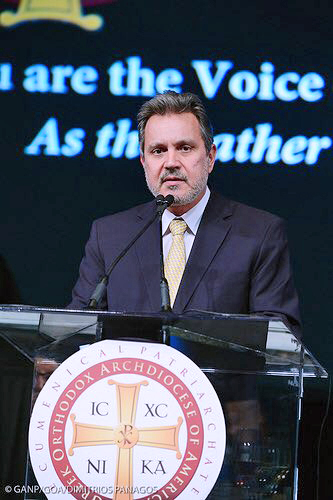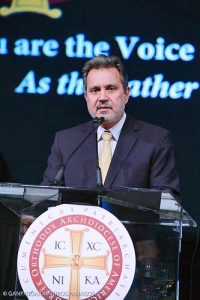Greece: An example for P.R. to follow rather than fear?


Haris Lalacos, Greece’s new ambassador to the United States, addresses a Greek Orthodox church gathering in Nashville on July 7. (Photo courtesy Greek Embassy, Washington.)
WASHINGTON — In the past 12 months, it’s become fashionable to equate Puerto Rico’s fiscal meltdown with the recent Greek tragedy in which a proud nation of 11 million inhabitants nearly got kicked out of the 28-member European Union.
In June 2015, the American Enterprise Institute hosted a panel titled “A Tale of Two Debt Crises: Is Puerto Rico America’s Greece?” Last September, the City University of New York (CUNY) sponsored a discussion with the opposite premise: “Puerto Rico is NOT Greece: Notes on the Role of Debt in U.S. Colonialism.”
Presidential hopeful Bernie Sanders even weighed in, telling economists at an August 2015 conference in Washington “it’s time for creditors to sit down with the governments of Greece and Puerto Rico and work out a debt repayment plan that is fair to both sides. The people of Greece and the children of Puerto Rico deserve nothing less.”
Yet the Greek economy might actually be in much better shape than the troubled economy of Puerto Rico to which it is often compared.
For starters, even though Greece’s annual per-capita GDP of $21,956 is a lot lower than that of Puerto Rico ($28,529) and its April 2016 unemployment rate of 23.3 percent was twice that of the Caribbean island (11.4 percent), Greece seems to be improving — while Puerto Rico is going in the other direction.
Haris Lalocos, the new Greek ambassador to the United States, told NIMB in an interview this week that his country has begun seeing the fruits of austerity and sacrifice.
“For several years now, Greece is not borrowing new money. The agreement that we have is to be able to repay past loans,” said the 59-year-old diplomat, who presented his credentials to President Obama three weeks ago. “In fact, we are decreasing the debt, and we have primary budget surpluses which fiscally and socially are very tough to deliver — but it’s an agreement we made and are honoring it.”
Lalacos added: “We hope to be able to strike the right balance between fiscal responsibility and growth. We see this is the only way out of a very difficult situation.”
In fact, last month, the board of directors of the Luxembourg-based European Stability Mechanism authorized the second tranche of €10.3 billion of financial assistance to Greece, as well as the first disbursement of this second tranche of €7.5 billion, allowing Greece to meet debt servicing obligations and help clear domestic arrears.
This decision “is a recognition of the Greek government’s commitment to carry out essential reforms,” said ESM Managing Director Klaus Regling, adding that “thanks to these measures and other reforms implemented in recent months, Greece is on track to return to economic growth.”
Economies in decline
The Greek economy shrunk by 1.5 percent in 2015 — the sixth consecutive year of negative growth — but is likely to expand by 0.5 percent this year and 1.7 percent in 2017, according to the IMF. Puerto Rico, on the other hand, saw its economy decline by 1.6 percent last year, and it’s projected to shrink another 2 percent in both 2016 and 2017.
At the height of the Greek crisis, it appeared likely that the 19-member Eurozone would expel Greece, leading to a “Grexit” from the EU itself. In 2012, the Athens government launched the largest sovereign debt default in history, and in June 2015, it became the world’s first developed country to miss an IMF loan repayment, with debt levels reaching €323 billion, or nearly €30,000 per capita.
Things have definitely improved since then, but Lalacos said it hasn’t been easy.
“It’s a painful process because it’s lasting too long, and because it’s based mostly on notions of austerity and fiscal responsibility — but without the counterbalancing element of economic growth,” he told us. “So we feel that Greece has been caught in a vicious circle, and our main objective is to complement what we have agreed with the institutions with a new element of growth in the overall package that is being applied to the Greek economy.”
The ambassador also said his center-left government is in the process of easing capital controls, allowing all cash to return to the Greek banking system. From November 2014 to June 2015, when those controls were enacted, deposits shrank by €42 billion.
“We have gradually relaxed those controls in our banking system. Hopefully, we will move to a full return to the status quo ante in a relatively short time,” he said.
Asked if he had any advice for Puerto Rico, Lalacos — who’s also served at Greek embassies in Australia, Turkey, Egypt and Macedonia — thought for a minute.
“No two cases are alike but there are other countries, even in Europe, which underwent and are still undergoing some very difficult times,” he replied. “We are also in a continent with very low growth rates. This has given rise to populism, ultranationalism and extreme political behavior in many European countries. Our advice would be simply to find the right mixture of economic stability, financial stability and economic growth.”
As to whether the recent Brexit might eventually lead to Grexit — as many in the EU have warned — Lalacos said he seriously doubts that.
“There is no marked tendency among Greek population to even entertain the thought of leaving the EU,” he insisted. “Greek society is pro-European. Greece wants more, not less, Europe.”











